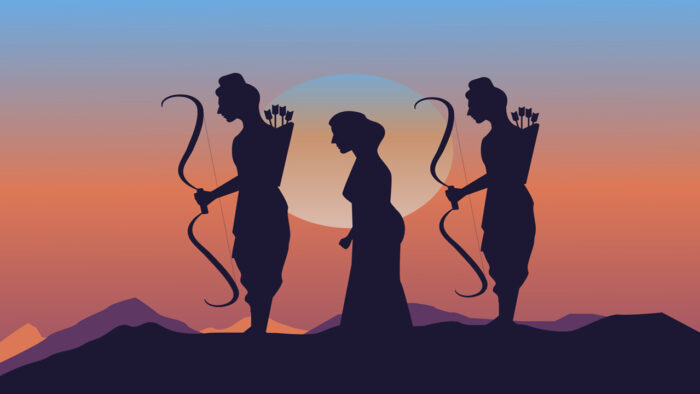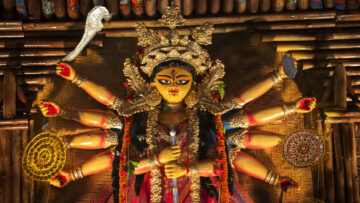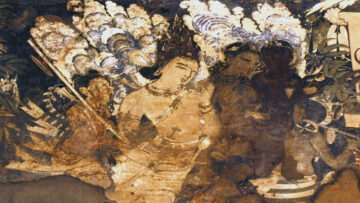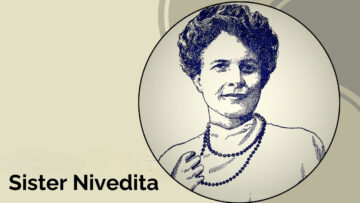In a discussion at home, this question came up and it got me thinking. Now, before I start, let me lay down my own inadequacies first. I am not a scholar of the Vedas or Upanishads or the Itihasas or the Puranas. I learnt Ramayana – as I suspect most Indians have from their own – from my mother and grandmother. I then read the Amar Chitra Katha version before reading C. Rajagopalachari’s and later the translated Valmiki Ramayan. That makes me in a sense the layest of laymen and so I can give the layman’s perspective on why, Shri Rama is revered in this land.
Where then, does this reverence for Shri Rama come from? A reverence that is very different from the feeling that Hindus have towards Shri Krishna. Krishna, is seen as a mischievous child, a friend, a brother, a lover, a husband, a miracle-worker, a master politician, a strategist, and even the awe-inspiring version of the Vishwaroopam, where he shows himself as the God of All things, big and small.
Shri Rama never gave us any miracles (except maybe that one instance of turning Ahalya back from stone. He never revealed himself as a God. Why then do Hindus revere him?
The answer lies in the behaviours that he demonstrated. Rama was maryada-purushottam. The greatest follower of dharma that this land has ever seen. Here was a prince, who was unfairly deprived of his kingdom and asked to go to the forest. He obeys without demur. And what’s more without rancour. His feelings of respect towards the stepmother who is responsible for sending him to the forest, do not change one bit. He is just following his dharma – that of following every wish of his parents.
In the forest, towards the end of the exile, his wife is kidnapped and he goes in search of her, finds her, fights her kidnapper and rescues her back. So what? You might ask. Well, think back to the times that they were living in. His own father had three wives from whom he begat his four sons and is said to have sixty thousand more. Even assuming that is hyperbole, he would have had multiple wives, for sure. Men had multiple wives in that age and it was the norm. For a man of that age, to take a vow of having only one wife, would have been extraordinary. And to go in search of that one woman and rescue her. Tell me again why this shouldn’t count as the greatest love story in the world?
And then it struck me. The reason that Hindus revere Shri Rama is because he is that ideal that we all strive towards. An almost unattainable ideal. The ability to follow his chosen dharma, no matter what the consequences. And his life also demonstrates the complexities of dharma. That each living being has, at any given point in time, to choose between multiple dharmas. Rama had his Rajadharma – the dharma of a raja, Putradharma – the dharma of a son, Patidharma – the dharma of a husband, of a brother, of a friend. At most points in time he followed them all. To the extent possible.
However, there were occasions when he had to choose. People always ask about why he sent Sitaji to the forest when she was pregnant. Why did he give weightage to the sayings of a washerman? It took me many years to figure out that it was because, his Rajadharma and Patidharma were in conflict. And he choose his Rajadharma. That was his choice. And he alone faced the agonies associated with it. His actions also show Hindus that every action, every choice we make, has an effect. No one is exempt. Not even Shri Rama. Dharma is tough. Karma is inexorable. Actions have consequences.
Then I got to thinking. Is it only Shri Rama who evokes this kind of reverence? Not at all. There are SO many characters in the Ramayana who stand as impossible-to-reach ideals.
Let’s start with Sitaji. She marries into the greatest kingdom of the land. Is supposed to be the queen. Yet, she gives it all up and happily followers her husband into the forest. She never complains about the hardships that she has to bear, because she knows she is with her man and her love. Even when she is kidnapped, and wooed by her captor who is the king of a fabulously rich kingdom, her thoughts are only on her soulmate. She followed her dharma of going with her husband and faced the consequences. Dharma is tough. Karma is inexorable. Actions have consequences.
Tell me again why we won’t revere someone like her?
What about Shri Rama’s brothers? We have heard throughout history of brothers killing brothers to get at the throne. Even Ashoka the “Great” is supposed to have killed every single one of his brothers to become the king. Yet, look at the impossibly high standards set by the brothers here.
One brother, Lakshmana, himself a newly wed, leaves his wife in the palace and follows his brother and bhabhi into exile. Not only that, he spends the next fourteen years solely tending to their needs, never thinking of his own needs. He is a servant to his brother and bhabhi in the forest and then a friend and comforter to his brother when his bhabhi is kidnapped. He is a soldier who fights shoulder-to-shoulder with his brother to get back his bhabhi. But he was separated from his wife for 14 long years. Dharma is tough. Karma is inexorable. Actions have consequences.
But wait, you think that is the highest ideal for a brother? Let me introduce you to Bharata. His mother is the one who induced the king, Dasharatha, to send her stepson to the forest so that her own son could become the king. A heaven-sent opportunity in any other story right? But Bharata. The great Bharata. I get goosebumps just thinking of his character. He goes to the forest to change Shri Rama’s mind. To get him to come back to Ayodhya and reclaim the throne that is rightfully his. When Rama refuses, Bharata takes his sandals from him, places them on his head, comes back to a little village outside Ayodhya, places the sandals on a throne and rules only as the regent, all the while, living as an ascetic. Dharma is tough. Karma is inexorable. Actions have consequences.
You think that’s the highest ideal of a brother? What of Shatrughna, the youngest? His twin, Lakshmana is serving the eldest brother. So Shatrughna, spends his time in helping the other brother, Bharata rule the kingdom on Rama’s behalf. Dharma is tough. Karma is inexorable. Actions have consequences.
What an ideal of brotherhood these four brothers demonstrate. How can one not revere them?
There are other characters in the Ramayana who show similar standards of behaviour. The boatman Guha, who helps Rama, Lakshmana and Sita cross the river on their way to the forest. His devotion is unmatched.
And then there is Hanuman. The Chiranjeevi. The Immortal. The Sankat Mochan. The one who banishes our problems. The vanara whose devotion to Shri Rama is such that even Lakshmana is envious of it.
But wait. Hold on. Hindus also revere, folks on the other side. On the side of Ravana, the kidnapper. Vibhishana, Ravana’s youngest brother, is one who follows his dharma and crosses over to Rama’s side. His dharma is to always stand for what is right, even when that necessitates him going against his own brother. He probably knew that he would be vilified by many and be seen as having betrayed his brother. Dharma is tough. Karma is inexorable. Actions have consequences.
Even more surprising is the fact that Hindus actually like Ravana’s other brother, Kumbhakarna even more. He followed his dharma of standing by his brother, even though he knows that what his brother has done is wrong. He advises him to return Sita to her husband, but at the end, he stands by his brother, fights and is killed. Dharma is tough. Karma is inexorable. Actions have consequences.
So, this is why Shri Rama and indeed the Ramayana is revered. It teaches Hindus about dharma. It shows us that actions have consequences and shows us through characters of impossibly high standards of dharma. Standards that we all can aspire to. And the ultimate lessons in life.
Dharma is tough. Karma is inexorable. Actions have consequences.
Feature Image Credit: istockphoto.com
Disclaimer: The opinions expressed in this article belong to the author. Indic Today is neither responsible nor liable for the accuracy, completeness, suitability, or validity of any information in the article.









